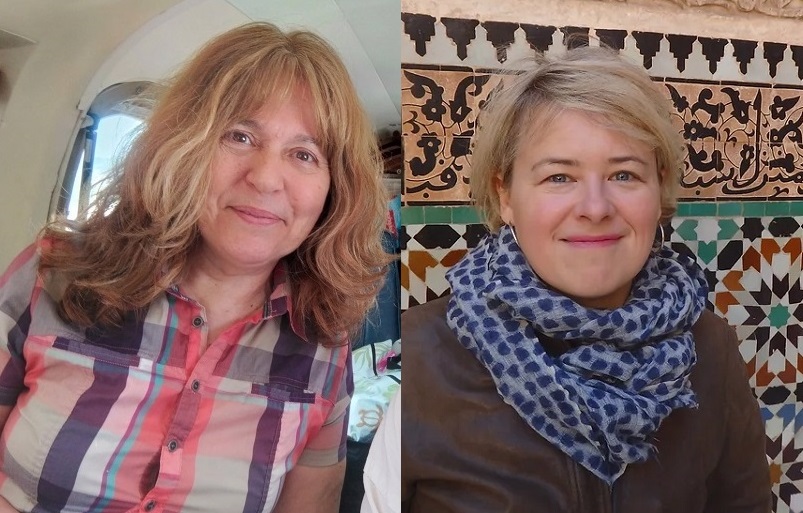Colonial globalization and language asymmetries, the research topics of the two 2023 ERC Advanced Grants awarded to UPF
Colonial globalization and language asymmetries, the research topics of the two 2023 ERC Advanced Grants awarded to UPF
The respective principal investigators of the projects will be Sandra Montón Subias, ICREA research professor at the UPF Department of Humanities, and Isidora Stojanovic, currently at the National Centre for Scientific Research in Paris, who is scheduled to join the Department of Translation and Language Sciences at UPF.

On 11 April, the European Research Council (ERC) announced the names of 255 outstanding leading researchers in Europe who will receive an ERC Advanced Grant within the framework of its 2023 call. UPF has obtained two grants, each endowed with more than two million euros, which will fund the research of two researchers, linked to the fields of Social Sciences and Humanities.
Sandra Montón Subias, an ICREA research professor and coordinator of the Colonialism, Gender and Materialities (CGM) and Social Archaeology and Gender Studies (GRASEG) research groups at the UPF Department of Humanities, is the principal investigator of the project “Material Culture, Gender and Maintenance Activities in Making and Resisting Early Modern Colonial Globalization. A Long-term Perspective from the Mariana Islands. (MaGMa)”, financed with 2,649,448 euros.
Isidora Stojanovic is a philosopher of language and an expert in semantics, currently linked as a senior researcher at the Jean Nicod Institute of the National Centre for Scientific Research (CNRS) in Paris, and is scheduled to join the UPF Department of Translation and Language Sciences. Her project, funded with 2,096,875 euros, is entitled “Valence asymmetries: the positive, the negative, the good and the bad in language, mind and morality (VALENCE ASYMMETRIES)”.
With two grants, UPF is the Spanish institution to have received the most ERC Advanced Grants in this 2023 call
The researchers’ projects are two of the 255 selected from a total of 1,829 applications (14% of submissions have received funding). All of them were reviewed by panels of internationally renowned researchers.
With two grants, UPF is the Spanish institution to have received the most ERC Advanced Grants in this 2023 call. State research centres have obtained a total of fourteen grants, six of which are destined for Catalonia.
A prestigious competitive call
ERC Advanced Grants are among the most prestigious and competitive in the EU, offering leading senior researchers the chance to carry out ambitious, curiosity-driven projects that could lead to major scientific breakthroughs. The new grants, endowed with nearly €652 million, are part of the Horizon Europe programme.
The selected candidates proposed conducting their projects at universities and research centres in 19 EU member states and associated countries, especially in Germany (50 grants), France (37) and the Netherlands (23). Grant recipients include 50 German, 31 French, 28 British and 22 Italian researchers and citizens of another 28 states.
The two UPF projects to obtain grants
Material culture, daily life and gender during modern colonial globalization in the Mariana Islands
The research by Sandra Montón Subías will be the first to investigate, from a holistic perspective, the connections that were established between material culture, daily life and gender in the shaping of the first modern colonial globalization (16th, 17th and 18th centuries) and resistance to this process, focusing on the Mariana Islands, in the north-west of the Pacific Ocean.
Using a transdisciplinary approach, the project will address the material worlds at the crossroads of modern colonialism, gender systems and maintenance activities. Maintenance activities refer to a set of daily practices that aim to satisfy fundamental human needs such as child socialization, cooking and, among others, care and attention to others. These activities are essential for the social continuity and well-being of the group in the short, medium and long term.
“MaGMa will analyse cultural changes and continuities in the Mariana Islands revealing cultural traits that are otherwise undetected, with the aim of understanding how maintenance activities and gender transformations became structural in shaping modern colonial ‘new normalities’ around the world”, Sandra Montón Subias asserts.
Language asymmetries: why do we express negative more often than positive aspects and how do we do it?
Isidora Stojanovic’s research project will analyse the so-called asymmetries of language, of thought and of morality, which explain, for example, why we tend to blame others more for the harm caused by their actions than congratulate them for the benefits they bring.
The research aims to examine the fundamental role of valence asymmetries, beyond emotions, to study how they affect value judgements and the language to express them. It also aims to demonstrate that these asymmetries are not necessarily irrational and are the result of a key component of our cognitive and linguistic architecture. Moreover, the purpose of the research, that of comprehensively explaining different types of asymmetry of linguistic phenomena related to lexicon, syntax or semantics, will be pioneering.
“VALENCE ASYMMETRIES is a pioneering attempt to ensure, in a crossed and enriching way, the premises between the different accounts of valence asymmetries. It will deploy philosophical methods (argumentation and conceptual analysis), formal and theoretical semantic models of values, and experimental methodology, from the perspectives of psycholinguistics and moral psychology”, Isidora Stojanovic affirms.
